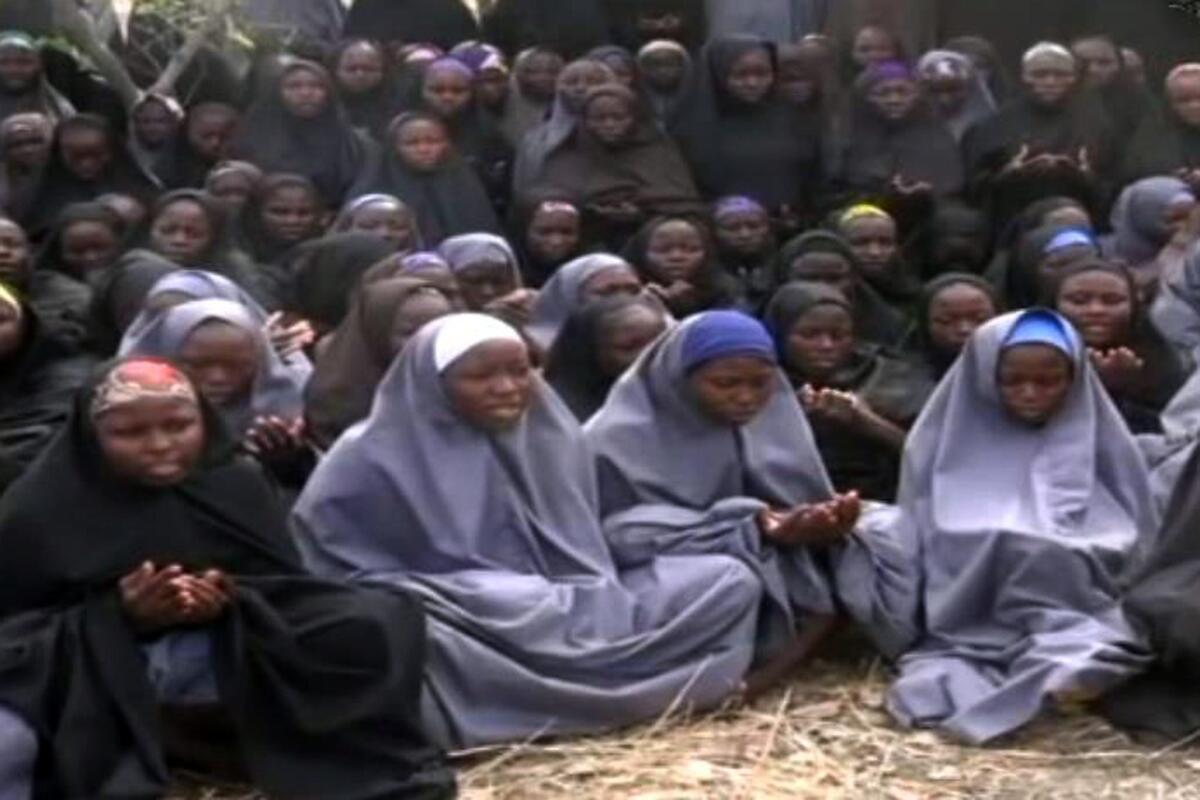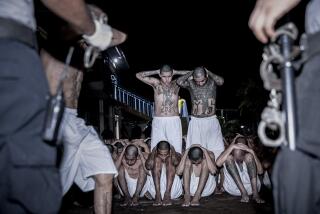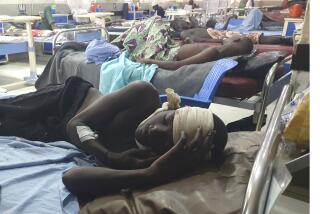Year after schoolgirls taken, report catalogs Boko Haram atrocities

A video released on May 12, 2014, purports to show the hundreds of schoolgirls abducted in Nigeria by Boko Haram.
- Share via
Reporting from Johannesburg, South Africa — As Nigerians vowed never to forget scores of missing schoolgirls abducted a year ago by Boko Haram, the horrifying scale of the Nigerian terrorist group’s atrocities was laid bare Tuesday in a report by Amnesty International.
The abduction shocked the world and sparked a global hashtag, #BringBackOurGirls. Yet the girls kidnapped in the town of Chibok accounted for a small proportion of the civilians abducted by Boko Haram, according to the rights group, which estimates that at least 2,000 girls and women have been taken, as well as many boys and men.
The Islamist group, targeting Muslims and Christians alike, killed at least 4,000 civilians last year and at least 1,500 in the first three months of this year, Amnesty International estimates, adding that the real number could be much higher.
In the Nigerian capital, Abuja, supporters of the Chibok girls marched Tuesday urging that more be done to find the abductees, with some fearing the students might never be rescued. Nobel Peace Prize laureate Malala Yousafzai released a letter of support to the girls, saying they would never be forgotten.
The 276 abducted girls had gathered last April 14 at a school outside Chibok to take their school exams. Boko Haram gunmen attacked, loaded the girls, almost all Christians, onto trucks and drove them away. Some escaped, but 219 remain unaccounted for.
Amnesty International research has documented 300 attacks on civilians by Boko Haram since the beginning of 2014, based on 189 interviews with victims and witnesses. The report says Boko Haram killed nearly 400 people in the town of Gamborou Ngala last year; at least 600 people in Gwoza; and hundreds in Baga in January.
“The conflict in northeast Nigeria has escalated from an internal security problem into a massive political, economic and social disaster,” says the report. “Human rights have been systematically violated and abused and international laws of war consistently disregarded by all the parties to the conflict.”
“Since 2013, Boko Haram has killed at least 6,800 people, mostly civilians,” the report says. “More than 1.2 million people were forced from their homes and hundreds of thousands of people have been made destitute.”
Boko Haram carried out 46 bomb attacks between January 2014 and March 2015, killing at least 817 people, according to Amnesty International, which called for the group’s commanders to be brought to justice for crimes against humanity.
“Our job is to shoot, slaughter and kill,” the report quotes one Boko Haram fighter as saying on a video.
The abduction of the Chibok girls came to define President Goodluck Jonathan’s failure to stem Boko Haram’s attacks. He did not mention the students for weeks after they had been taken, and Boko Haram leader Abubakar Shekau released a chilling video, gloating that he planned to sell the girls and referring to them as slaves.
The government’s failure to protect civilians and territory, as the terror group took over scores of villages, was a key issue in the recent presidential election, which saw Jonathan lose power to former military dictator Muhammadu Buhari, who promised to destroy Boko Haram.
But Buhari, who takes office next month, voiced the fears of many when he admitted late Monday that the girls may never be found, though he vowed his government would do all it could.
“We do not know if the Chibok girls can be rescued,” he said. “Their whereabouts remain unknown. As much as I wish to, I cannot promise that we can find them.”
According to Amnesty International, abducted girls and women were often forced to marry jihadists and were frequently raped. Some were trained to fight or carry out bombings. Kidnapped men and boys had to become fighters, the group said, though some men were spared because they could provide services, such as medical care or mechanical repairs.
“I was raped several times when I was in the camp. Sometimes five of them. Sometimes three, sometimes six. It went on for all the time I was there,” said a 19-year-old named Aisha, who told Amnesty International that she was imprisoned by Boko Haram for several months, trained to fight and forced to take part in attacks. She said she saw more than 50 people killed, including her sister.
“Some of them refused to convert. Some refused to learn how to kill others. They were buried in a mass grave in the bush. They’ll just pack the dead bodies and dump them in a big hole, but not deep enough. I didn’t see the hole, but we used to get the smell from the dead bodies when they start getting rotten,” she told the researchers.
The report says that when Boko Haram attacked towns and villages, it first captured arms and ammunition from police or the army, then attacked civilians, rounding up and executing men of fighting age. It imposed harsh rules, banning women from leaving their houses and imposing harsh punishments including floggings and stonings.
A 15-year-old boy from Bama, told Amnesty International that he had seen 10 stonings in the town.
“They will gather all the children and ask them to stone. I participated in the stoning. They will dig a hole, bury all the body and stone the head. When the person dies, they will leave the stones until the body decays.”
Another victim, Ahmed, 20, said he saw 100 men killed by having their throats cut in the town of Madagali in December.
“They were slaughtering them with knives. Two men were doing the killing. We all sat on the ground and waited our turn,” he said, according to the report. “I started feeling sick. Some peed on themselves. One Boko Haram fighter said we are not real Muslims because we have refused to join the fight.”
Alhaji, 18, another prisoner, said the the only reason he escaped death was because the knife being wielded by a militant became too blunt to cut throats.
“So he threw me and some other men onto the heap of dead bodies,” he told Amnesty International. “I closed my eyes. He took his gun and opened fire at us. One man fell on me. One bullet hit me on my right shoulder. There was blood all over me.”
The report says it was difficult to establish the real number of killings and abductions because the area is so dangerous for journalists and human rights workers and because of “the sheer number of the attacks,” around 20 a month.
In one major attack on Baga in January, Amnesty International was unable to determine how many people were killed, other than to say it was in the hundreds. Nigeria’s military spokesman insisted that the number of dead was no greater than 150, while some reports have suggested that thousands were killed.
Follow @robyndixon_LAT on Twitter for news out of Africa
More to Read
Sign up for Essential California
The most important California stories and recommendations in your inbox every morning.
You may occasionally receive promotional content from the Los Angeles Times.










